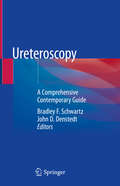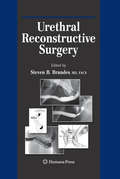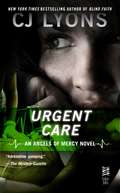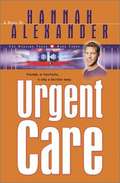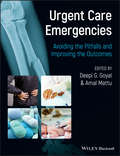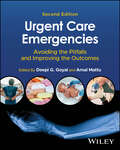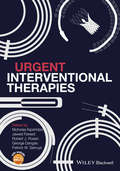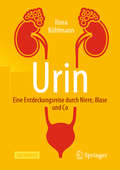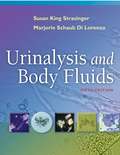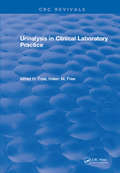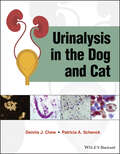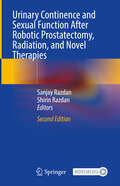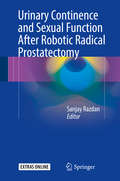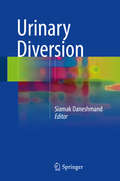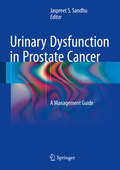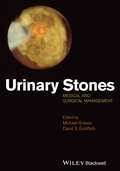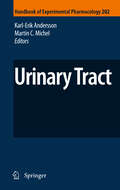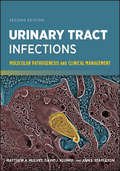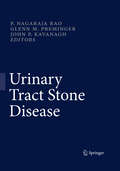- Table View
- List View
Ureteroscopy
by Manoj MongaUreteroscopy: Indications, Instrumentation & Technique provides a comprehensive and state-of-the-art review of ureteroscopy and will serve as a valuable resource for urologists throughout the world. The volume provides evidence based outcomes to support the expanding indications for ureteroscopy as well as a strong emphasis on appropriate patient selection. The book also provides detailed recommendations for the step-by-step approach to ureteroscopy from both an instrumentation and techniques perspective. The work is extensively illustrated with endoscopic images and accompanied by a web site of video clips which further highlight the clinical application of available endoscopic techniques. The text also includes highly practical presentations of complex endourologic case presentations with expert analysis and editorial commentary. Example cases would include common but challenging cases of ureteroscopy for transitional cell cancer, horseshoe kidneys, hutch diverticulum, and pregnancy. Ureteroscopy: Indications, Instrumentation & Technique provides a unique and valuable resource in the field of ureteroscopy and will include basic instructions for those currently in training or those who have yet to adapt intrarenal ureteroscopy into their surgical armamentarium. Advanced ureteroscopic approaches are also covered for those wishing to enrich their current clinical expertise.
Ureteroscopy: A Comprehensive Contemporary Guide
by Bradley F. Schwartz John D. DenstedtThis text provides a comprehensive and contemporary discussion of current indications, techniques, technology, and results in ureteroscopy from the world leaders who perform this procedure. It provides not only the latest literature and data regarding URS but also tips and tricks for the reader when performing various URS procedures. Historical prospective will link the reader with the past and provide insight as to why we have evolved into a minimally invasive specialty. Technological advancements of both flexible and rigid ureteroscopic procedures are included to provide the reader with many practical considerations when choosing this modality for their patients. Renowned experts in the field discuss the myriad of supplemental devices that accompany URS and how best to utilize them in one’s practice. Unique to this predominantly clinical text, are sections on simulation and the socioeconomics of URS that demonstrate how the student can learn and acquire techniques and skills of their own. Ureteroscopy: A Comprehensive Contemporary Guide provides its readers with a thorough and complete representation of the current state of URS and its applications and guide those interested in improving their techniques, armamentarium and horizons in this ever-changing world of minimally invasive urology.
Urethral Reconstructive Surgery
by Steven B. BrandesUrethral injury may be of secondary importance when the patient comes into the emergency room, but devastating urological complications, such as sexual dysfunction, incontinence, and stricture, may drastically impair quality of life in the long term. This book provides a comprehensive review of adult urethral reconstructive surgery. It evaluates complex urethral problems and includes practical aspects of wound healing and applicable plastic surgical techniques.
Urgent Care
by C. J. LyonsThe third Angels of Mercy novel from the New York Times bestselling author of Blind Faith. Angels of Mercy Hospital charge nurse Nora Halloran has been living with a painful secret for two long years. But when a coworker is brutally assaulted and killed, she knows she can no longer remain silent. Determined to unmask the murderer, Nora teams up with her friends--Lydia, an ER attending doctor with a secret of her own; Gina, the once-cocky resident struggling to strike a balance between her family and her job; and Amanda, the med student caught between her conscience and her career. As the victim count grows, Nora must face her deepest fears and reveal all her secrets to save the man she loves, and stop a killer from striking again. Urgent Care includes a teaser for the fourth Angels of Mercy novel, Critical Condition.
Urgent Care (The Healing Touch, Book #3)
by Hannah AlexanderAfter years in pastoral ministry, Archer Pierce has begun to question his calling. In the midst of a violent storm, he disappears, and the citizens of Dogwood Springs begin a frantic race to find him. Lauren McCaffery is falling deeply in love with the widowed Dr. Grant Sheldon but when he pops the question, she panics. Is she prepared to take on a ready-made family? And, can she ever live up to the image of "perfect wife and mother" Grant's late wife seemed to portray? Dr. Mitchell Caine's personal struggles are affecting his practice and his work in the ER and now he is experiencing glimmers of a memory that is too horrifying to believe ... And, his troubled daughter has returned home after years of estrangement. Can Mitchell hope to help her when he has his own dark secrets?
Urgent Care Emergencies: Avoiding the Pitfalls and Improving the Outcomes
by Amal Mattu Deepi G. GoyalUrgent Care Emergencies Avoiding the Pitfalls and Improving the Outcomes If you see patients in an urgent care center, minor injury unit or other acute care setting, this new clinically-focused guide will help you avoid high-risk pitfalls and achieve optimal outcomes. This must-have resource covers a wide range of emergencies that may be encountered in an urgent care setting, focusing on those that can occur with the most commonly-encountered complaints and conditions, including: Genitourinary complaints Common infections Orthopedic injuries Wounds Back pain Dermatologic complaints The book also includes chapters on common pitfalls during the HEENT examination, effective patient communications, urgent care pharmacology pitfalls, special issues in the care of pediatric and geriatric patients, and more. Each chapter is authored by an experienced acute care clinician and includes clinical pearls that you can apply directly to the care of your own patients. The urgent care center can be a challenging and fast-paced environment, and pitfalls, especially those encountered during emergencies, can have serious consequences for patients' immediate well-being, their recovery time, and possibly their long-term prognosis. More than ever, you need a resource you can trust that has been tailored specifically to the needs of providers in the low-acuity setting.
Urgent Care Emergencies: Avoiding the Pitfalls and Improving the Outcomes
by Amal Mattu Deepi G. GoyalNewly updated reference highlighting high-risk aspects of common, seemingly minor medical illnesses and injuries Urgent Care Emergencies is a concise, quick reference designed to help healthcare professionals avoid pitfalls in challenging and fast-paced clinical settings. This text focuses on caring for patients with seemingly minor acute illnesses and injuries that may carry substantial morbidity if not appropriately recognized and managed. The text covers a wide range of emergencies that may be encountered in urgent care centers, clinics, or other acute care settings. It focuses on the most commonly encountered complaints and conditions, including genitourinary issues, common infections, orthopedic injuries, wounds, back pain, head and neck problems, and skin complaints. This new edition also includes additional chapters on the importance of effective patient communication, pharmacologic pitfalls, special issues in the care of pediatric and geriatric patients, and a special chapter focused on legal pitfalls. As healthcare continues to evolve, this Second Edition serves as an essential resource for clinicians in urgent care and emergency departments. Each chapter is authored by experienced acute care clinicians and includes clinical wisdom that readers can apply directly to the care of their own patients. Written by a team of highly qualified authors, Urgent Care Emergencies stresses important topics such as Seemingly minor orthopedic injuries with a high risk for limb-threatening vascular injuryThe limitations of radiographic imaging in the evaluation of subarachnoid hemorrhageThe potential life-threatening complications of local anestheticsThe importance of considering necrotizing fasciitis or Fourniere gangrene in seemingly minor soft tissue infectionsRed flags in pediatric back painKey factors in evaluating sore throat to prevent morbidity and speed resolution This updated edition of Urgent Care Emergencies is an essential at-your-fingertips reference for any physician, advanced practice provider, and other medical professional working in a setting that manages acute unscheduled medical concerns.
Urgent Care: (InterMix)
by C. J. LyonsThe third Angels of Mercy novel from the New York Times bestselling author of Blind Faith.Angels of Mercy Hospital charge nurse Nora Halloran has been living with a painful secret for two long years. But when a coworker is brutally assaulted and killed, she knows she can no longer remain silent. Determined to unmask the murderer, Nora teams up with her friends--Lydia, an ER attending doctor with a secret of her own; Gina, the once-cocky resident struggling to strike a balance between her family and her job; and Amanda, the med student caught between her conscience and her career. As the victim count grows, Nora must face her deepest fears and reveal all her secrets to save the man she loves, and stop a killer from striking again. Urgent Care includes a teaser for the fourth Angels of Mercy novel, Critical Condition.
Urgent Interventional Therapies
by George Dangas Patrick Serruys Nicholas Kipshidze Robert T. Rosen Jawed FareedIllustrating the differences between urgent interventions and interventions performed to manage chronic conditions the authors present the chapters in a consistent template for ease of use covering; background, indications, evidence review, device description, procedural techniques, follow-up care, and complications.Shows the differences between interventions performed to manage chronic conditions and interventions that are truly urgentChapters follow a consistent structure from background through indications, evidence review, device description, procedural techniques to follow-up care and complicationsMore than 40 high definition videos, hosted on companion website www.wiley.com/go/kipshidze/interventionaltherapies, complete with tips and tricks, provide a visual learning tool
Urin - Eine Entdeckungsreise durch Niere, Blase und Co
by Ilona KühlmannWasserlassen, was passiert da eigentlich? Wie entsteht Urin und welche Wege durchläuft er, bis er den Körper verlässt? Lassen Sie sich aufklären über interessante Fakten und Mythen rund um den wertvollen Körpersaft. Mit Tiefgang und hohem Informationsgehalt, aber vor allem mit viel Humor stellt Ilona Kühlmann die tabuisierte Flüssigkeit mit allen mitwirkenden Organen in den Mittelpunkt. Verständlich und mit einer Vielzahl an heiteren und kuriosen Geschichten rund ums „Pipi“ erkundet sie die geheimnisvolle Welt der Urologie und der Nephrologie und beantwortet kenntnisreich zahlreiche spannende Fragen, u.a.:· Wie viel von dem, was oben reingeht, kommt unten wieder raus?· Wann ist die Blase voll?· Wie tickt die Niere - hat sie einen Tagesrhythmus mit Ruhephasen?· Was läuft ab, wenn wir uns vor Lachen in die Hose machen?· Welche Werte stecken im Urin?· Kann ich Harnsteinen vorbeugen?· Ist Urin ein Heilmittel?· Die mittelalterliche Harnschau - reiner Hokuspokus?· Und was hat der Spruch "Geld stinkt nicht" in diesem Buch zu suchen?Für alle Neugierigen, die genau wissen wollen, was abläuft, wenn die Blase drückt. Lassen Sie sich mitnehmen auf die Entdeckungsreise ins geheimnisvolle Labyrinth des Harntrakts und schmunzeln, staunen, lernen Sie.
Urinalysis and Body Fluids (Fifth Edition)
by Susan King Strasinger Marjorie Schaub Di LorenzoThis thoroughly updated 5th Edition provides you with concise and carefully structured full-color instruction in the handling and analysis of non-blood body fluids. You will learn how to handle and preserve the integrity of body fluid specimens and how to keep yourself and your laboratory safe from infectious agents! Practical, focused, and reader friendly, this popular text teaches the theoretical and practical knowledge every clinical laboratory scientist needs to handle and analyze non-blood body fluids, and to keep you and your laboratory safe from infectious agents. The 5th Edition has been completely updated to include all of the new information and new testing procedures that are important in this rapidly changing field. Case studies and clinical situations show how work in the classroom translates to work in the lab.
Urinalysis in Clinical Laboratory Practice
by Helen M FreeThis book discusses urinalysis in clinical laboratory practice, including a historical overview, methods, future endeavours.
Urinalysis in the Dog and Cat
by Patricia A. Schenck Dennis J. ChewUrinalysis in the Dog and Cat A comprehensive up to date textbook for performing and interpreting urinalysis in dogs and cats with content that remains accessible to those in primary care and specialty practices. In Urinalysis in the Dog and Cat, a logical sequence to collection of urine, performing the complete urinalysis (physical and chemical properties along with urinary sediment microscopy), and interpretation of results is presented. The FAQ chapter and the chapter on urinalysis case examples provide easily accessible information for primary care veterinarians and technicians as well as veterinary students. Each didactic chapter is designed to provide basic information first and then more advanced materials deeper into each chapter. Some materials will also be useful to specialists and those in advanced training. An extensive review of proteinuria is included as a separate chapter. Automated urine chemistry by dipstrip and automated urinary sediment microscopy are discussed in some detail as this technology increasingly will be incorporated in veterinary laboratory practice. The text is accompanied by hundreds of high-quality photographs and medical illustrations that highlight common and rare findings from the urine of dogs and cats. Numerous algorithms suggest possible pathways for the diagnosis and treatment of urinary disorders. This book is destined to be widely used in veterinary hospitals by seasoned and young attending veterinarians seeking to know more about urinalysis, as well as by veterinary laboratory technicians. Several sections of this book will be useful in the teaching of basic concepts to veterinary students. The authors have also included: An introduction to the philosophy of urinalysis and the detailed information about collection of urine from dogs and cats. Comprehensive explorations of urine sample handling, preparation, and analysis. Detailed aspects of USG as the most important physical property of canine and feline urine In-depth discussions of urine chemistry dipstrip evaluation for pH, protein, occult blood, glucose, ketones, and bilirubin. Extensive detailing of urinary sediment microscopy. Sections on FAQ and urinalysis case examples allow the reader to test their knowledge about urinalysis. Urinalysis in the Dog and Cat is an essential reference for primary care veterinarians, veterinary technicians, veterinary students, those in advanced training programs, and specialists interested in learning more about disorders of the urinary tract.
Urinary Bladder Pathology
by Jae Y. Ro Haijun Zhou Charles C. GuoThis book focuses on bladder cancer pathology, including primary bladder malignancies and other tumor varieties, with an emphasis on diagnostic pitfalls and clinical relevance. It also describes normal bladder histology, benign abnormalities with cancer mimickers, and cancer carcinogenesis, which are important subject matter for understanding bladder cancers, correct diagnosis, and differential diagnoses. Accurate diagnosis of bladder cancer plays a central role in daily pathology practice, clinical management, and prognosis. Advances in immunohistochemistry and molecular pathology have enhanced the accuracy of cancer pathology diagnoses. In addition to covering the anatomic and histologic features of bladder tumors, this book also reviews recent molecular and immunohistochemical advances in these areas. Recently updated clinical management information is also presented in this book.Written by experts in the field, Urinary Bladder Pathology serves as a useful resource for practicing pathologists, pathology trainees, and other health professionals who treat patients with bladder cancers.
Urinary Continence and Sexual Function After Robotic Prostatectomy, Radiation, and Novel Therapies
by Sanjay Razdan Shirin RazdanThis text focuses on the anatomical, physiological, pathological, and technical aspects of post robotic prostatectomy and post radiation urinary continence and erectile function. This edition has a wider focus than the previous, incorporating radiation, focal therapy, personalized medicine, and medical oncology. It serves as a one-stop shop of pearls on how to maximize functional outcomes in patients undergoing treatment for prostate cancer. This volume provides a comprehensive insight into the mechanisms responsible for maintaining urinary continence and erectile function and elucidates the key concepts and techniques utilized to achieve early return of urinary continence and erectile function after robotic radical prostatectomy and radiation. It includes a state-of-the art exhaustive review of tips and tricks utilized to achieve the trifecta of cancer control, urinary continence, and erectile function in different clinical scenarios like large prostates, post TURP, and in salvage settings. Authors discuss step-by-step surgical techniques with pre- and post-operative interventions that are known to improve urinary and sexual function. All chapters are written by world-renowned experts in their fields and include extensive illustrations and videos to make this the most interactive and visually appealing text available. Urinary Continence and Sexual Function After Robotic Prostatectomy, Radiation, and Novel Therapies will be an invaluable addition to every urologist’s library.
Urinary Continence and Sexual Function After Robotic Radical Prostatectomy
by Sanjay RazdanThis text focuses exclusively on the anatomical, physiological, pathological, and technical aspects of post robotic prostatectomy urinary continence and erectile function. It provides a comprehensive insight into the mechanisms responsible for maintaining urinary continence and erectile function and elucidates the key concepts and techniques utilized to achieve early return of urinary continence and erectile function after robotic radical prostatectomy. Surgical techniques with pre and post-operative interventions known to improve urinary and sexual function are integrated. A step- by- step "evidence- based" description of surgical techniques utilized in achieving the goals of urinary continence and erectile function are the hallmark of this book. A state-of-the art exhaustive review of "tips and tricks" utilized to achieve the trifecta of cancer control, urinary continence and erectile function in different clinical scenarios like large prostates, post TURP, and salvage robotic prostatectomies complete the text and make it the most exclusive resource available for both the expert and the novice robotic surgeon looking to improve patient outcomes after robotic radical prostatectomy. All chapters are written by world renowned experts in their fields and include extensive illustrations and videos to make this the most interactive and visually appealing text available.
Urinary Diversion
by Siamak DaneshmandThis book offers a detailed description of various forms of urinary diversions, including the ileal conduit, orthotopic neobladder, and a variety of continent cutaneous diversions with specific focus on the techniques of reconstruction, appropriate patient selection, and management of common complications. The book also includes chapters on management of complications encountered with various forms of diversion. There are also chapters devoted to quality of life following urinary diversion and well as future perspectives. Urinary Diversion will be of great value for the urologist in training or in practice who wishes to not only expand the repertoire of urinary diversions offered to patients but also refine techniques of managing common complications.
Urinary Dysfunction in Prostate Cancer
by Jaspreet S. SandhuThis volume provides a comprehensive, state-of-the-art review of this topic. It reviews natural history, etiology, management, and prevention of urinary dysfunction. The text covers the multiple new treatments for prostate cancer that have been introduced as well as reviewing the etiology, risk factors, and possible prevention of urinary dysfunction in men with prostate cancer. This textbook provides a concise yet comprehensive summary of the current status of the field that will help guide patient management and stimulate investigative efforts. All chapters are written by experts in their fields and include the most up-to-date clinical information Urinary Dysfunction in Prostate Cancer - A Management Guide will serve as a valuable resource for clinicians, surgeons and researchers with an interest in urinary dysfunction caused by prostate cancer or its treatments.
Urinary Fistula
by René Sotelo Juan Arriaga Charles F. PolottiAlthough the condition of fistula is universal, this new book addresses not only obstetric fistulas that have been the most studied, but also those that affect men and those related to specific situations such as kidney transplantation. We also make the first formal publication on fistulas present in transgender patients, which have never been studied before. The book is organized in an accessible way and with collaboration of leaders in the field who contribute their knowledge and fully updated experience.
Urinary Stents: Current State and Future Perspectives
by Federico Soria Duje Rako Petra De GraafThis open access book provides a concise overview of a range of aspects related to urinary stents. Sections within the work cover clinical and recent technological advancements in the field. Chapters feature detailed coverage of the different surgical, pharmacological and palliative treatments currently available. Insight is also given on current limitations of urinary stents and how these can be overcome by utilizing anti-biofilm coatings; new biomaterials, drug-eluting stents, and biodegradable stents. Therefore, enabling the reader to systematically gain a detailed understanding of the subject.Urinary Stents is a practical, multi-disciplinary focused resource on the complications and applications of ureteral, urethral and prostatic stents in day-to-day clinical practice. A vital read for all medical professionals and researchers who work in this area.
Urinary Stones
by David Goldfarb Michael GrassoAcute urinary stones cause one of the most painful sensations the human body can experience, more painful than childbirth, broken bones, gunshot wounds or burns. Master your patient management with this comprehensive guide to a debilitating medical condition. Urinary Stones: Medical and Surgical Management provides urologists, nephrologists and surgeons with a practical, accessible guide to the diagnosis, treatment and prevention of urinary stone disease.Divided into 2 parts - covering both medical and surgical management - leading experts discuss the key issues and examine how to deliver best practice in the clinical care of your patients.Topics covered include:Evaluation and management of stones in childrenRenal colic and medical expulsive therapyImaging in stone disease: sonography, contrast based fluoroscopy, computed tomography and magnetic resonance urographyMultimodality therapy: mixing and matching techniques to improve outcomeComplications of stone diseaseInterpretation of 24 hour urine chemistryPrevention of recurrent calcium, uric acid, struvite and cystine stonesThe different surgical techniques, including: ureteroscopy, shockwave lithotripsy, ureteroscopic lithotripsy and percutaneous nephrostolithotomyPacked with high-quality figures, key points, and management algorithms, easy to follow, clear clinical guidance is supported by the very latest in management guidelines from the AUA and EAU.Brought to you by the best, this is the perfect consultation tool when on the wards or in the office.
Urinary Tract
by Karl-Erik Andersson Martin C. MichelThe basic anatomy and physiology of the urinary tract, the validity of animal models and other methodological considerations as well as a range of potential therapeutic targets are comprehensively reviewed by leading international experts, making this a unique reference source for basic scientists and research-minded clinicians alike
Urinary Tract Infection: Clinical Perspectives on Urinary Tract Infection
by Abhay Rané Ranan DasguptaThe causative organisms of Urinary Tract Infection are dynamic in terms of their virulence and resistance patterns, leading to challenges in the prevention and treatment of urinary infection. This is of relevance in both primary and secondary care, and many of the challenges are similar in both developed and developing countries alike. UTI is also associated with considerable cost in terms of morbidity, economic and research expenditure. Written by an exceptional and well-known team of clinical experts, the purpose of Urinary Tract Infections addresses key questions facing physicians about this condition. This book is written primarily for general physicians who wish to have a broad understanding of a number of important issues concerning infection in parts of the urinary tract. Specialists may also find the book useful as a quick reference guide.
Urinary Tract Infections: Molecular Pathogenesis and Clinical Management (ASM Books)
by Matthew Mulvey David Klumpp Ann StapletonA comprehensive overview of clinically important infections of the urinary tract Urinary tract infections (UTIs) continue to rank among the most common infectious diseases of humans, despite remarkable progress in the ability to detect and treat them. Recurrent UTIs are a continuing problem and represent a clear threat as antibiotic-resistant organisms and infection-prone populations grow. Urinary Tract Infections: Molecular Pathogenesis and Clinical Management brings the scientific community up to date on the research related to these infections that has occurred in the nearly two decades since the first edition. The editors have assembled a team of leading experts to cover critical topics in these main areas: clinical aspects of urinary tract infections, including anatomy, diagnosis, and management, featuring chapters on the vaginal microbiome as well as asymptomatic bacteriuria, prostatitis, and urosepsis the origins and virulence mechanisms of the bacteria responsible for most UTIs, including uropathogenic Escherichia coli, Proteus mirabilis, and Klebsiella pneumoniae the host immune response to UTIs, the rise of antibiotic-resistant strains, and the future of therapeutics This essential reference serves as both a resource and a stimulus for future research endeavors for anyone with an interest in understanding these important infections, from the classroom to the laboratory and the clinic.
Urinary Tract Stone Disease
by Nagaraja P. Rao John P. Kavanagh Glenn M. PremingerUrinary stone disease constitutes more than a quarter of urologists' workload in the Western countries and is more than half in the Middle-East and Central Asian countries. The surgical management of stone disease has changed considerably in the last five years and our understanding of mechanism of stone disease has improved with some old concepts discarded and newer theories gaining ground. Covering the entire spectrum of urinary stone disease and with contributions of more than fifty internationally recognised experts, this exhaustive and complex reference work will be invaluable to all urologists, nephrologists and non-medical scientists.

